QuestionHello,
My ferrte Reggie has not been himself for a few days, he has slept a lot more than usual and when i went to wake him a few days ago he was very floppy and wouldn't wake up. He also has been squeeling and twitching in his sleep which he has never done before. we took him to the vet who gave him an anti inflamatory. and said to wait until the next day. he came out to play that night but the next morning was too fats a sleep to come out. The vet has given steriods and antibiotics for the next few days.
a few hours after his tablets he went really hyper for approx 2 hours then fell asleep. he also has runny eyes now. I've spent the last few days on the internet and keep coming across insolinma. i'm concerned he may have this as he does lie on the carpet and stare into space for a few seconds and then gets on with whatever he was doing. He has done this for ages and i have never thought anything of it. In your experience with ferrets could does this sound like insolinoma? and if so will the drugs the vet is giving at the moment have any negative sude affects? also what should i be feeding? i am giving the tablets in ferretvite (which i presume has sugar in it)
please help, many thanks, Anna (and Reggie)
AnswerPoor Reggie! Insulinoma could indeed be the cause for your little guy's strange behavior. The symptoms do indeed include what you describe. Here are some excellent web sites with some useful information including the common symptoms:
http://www.ferretcentral.org/faq/med/insulin.html
http://www.heidihoefer.com/pages/ferrets/ferret_insulinoma.htm
http://www.thechipster.com/fert-man.html
Here is my brief summery of the tech-talk:
Insulinoma is caused by tumors on the pancreas. "Nodules" form that increase the amount of insulin in the blood stream, causing the amount of glucose to drop. Since the brain and body runs on glucose, a sudden lack of it causes a coma-like state, with non-responsive staring, pawing at the mouth, glazed eyes, seizures, lethargy, weakness of the hind end, etc.
So what can you do about it?
That depends on your ferret. Surgery can be an option, although it is not uncommon to have more of these nodules grow back and is less of an option in older pets due to the risks. Steroids such a pred are also used in cases where surgery cannot be preformed. They will not stop the disease, but they will help slow the progression. I am guessing the antibiotics are as a precaution in case Reggie's behavior is due to another cause. Antibiotics, while they will not harm your ferret, will not help prevent insulinoma.
If Reggie starts showing symptoms of another insulinoma attack (i.e. staring off into space), give him something sugary such as honey, nutrical or kyrosyrup to bring up his Glucose levels. A few licks, or rub it on his gums if unresponsive, should help him snap out of it. Don't give him sugary foods under any other circumstance. I am not sure of the ingredients of ferretvite. If there is sugar in there (anything that ends in -ose) you can use it to help him come out of an insulinoma attack but discontinue it for any other use.
How did he get it?
Diet and sugary treats are a BIG factor, but it could also be genetic. Do you feed raisins and treats with a high sugar content? If so, please discontinue immediately. Most ferret-specific brands of food and treats are not good for the little guys and can potentially cause insulinoma!!!
Can You test for it?
YES, you can! If you fast your ferret for 4 hours (no more than 6) and have your vet preform a quick blood glucose test. This literally takes only one drop of blood, and you will get a reading within 10 seconds. If his BG is less than 90, insulinoma is a likely cause.
Since Diet is such a big factor what to feed?
The proper foods are essential and it is never too late to switch brands. There are several important things to look for when selecting a brand or brands of kibble. It must contain high fat and protein content. Generally look for 35-40 percent protein (I have found any higher creates soft stool) and around 22 percent fat. Every brand is different, and that is why I tend to choose 3 of the best, and create a mixture. For older ferrets over 5 years of age, look for less protein (more on the 30-35 percent side), since it can cause stress on the kidneys. Whichever brands you choose, make sure the first 3 ingredients are meat based and try to stay away from animal by-products since these are "filler" and contain less nutritional value. Make sure there are no vegetable additives and minimal carbohydrates, since ferrets are obligate carnivores and cannot digest plant material. If you decide to switch brands, always introduce the new type by mixing it in with the old kibble. I generally start with a 20/80 mixture, then increase the amount of new food over the next few days. This allows the sensitive ferret tummies to get used to the new diet.
Here are some brands I recommend and personally use:
Feline Wellness Core - very good and readily available
Innova Kitten EVO
Innova Ferret EVO - better than the kitten version but impossible to find
Totally Ferret - contains by-products, but should be ok if mixed
Serengeti Cat (Timberwolf) - I love this brand. Very good!
This list is by no means all inclusive. There are many other good types available, just check the labels. Not all premium kitten/cat kibble is good for these guys, and not even all brands of ferret-specific food! These brands tend to be pricey and can be found or ordered in most holistic pet food stores. It is not uncommon for a 8 lb bag to be $20, but if you keep the kibble in airtight containers such as those plastic cereal ones you can get from Walmart, you are going to be all set for a long time! Also, i keep all of my food brands in separate containers and cut out/tape the ingredients/analysis to the container for future reference. That way, I can create and adjust the best mixture that works for my guys. It really is trial and error but i usually start with a mixture of the three that I think work best.
Just as a side-note, I do not recommend feeding a raw diet. Bacteria and other harmful pathogens and can be transferred by feeding raw meat. These can include tapeworms, salmonella, and e-coli. No doctor i have ever worked with has suggested a raw diet for any animal.
Also, just for reference, stay away from vegetables, fruits and milk products as treats. Raisins can kill, and too much sugar (anything that ends with -ose) can lead to insulinoma and other complications. I feed my guys dehydrated 100 percent chicken treats with no additives as snacks. These can be found in the canine section of your local pet store. Always check the ingredients for whatever you buy, since most store bought brands are not good for the little guys!
There is a short FAQ that contains some info on nutrition from the AFA's Official Website:
http://www.ferret.org/read/faq.html
Best of luck, and I hope I covered all of your questions in a reasonably understandable manner. I do indeed believe he is showing classic symptoms of insulinoma, but please follow up with a veterinarian with the glucose test for confirmation. Personally, i have never seen insulinoma in my own critters, and perhaps it is because of a no-sugar diet or that they were not genetically predisposed to the condition. It is only speculation with my own ferrets, but there has been a proven correlation between good diet and a decreased level of risk to the disease. You may also notice an AMAZING change in the softness and health of their coat. One little girl I rescued at a year old, and changed her from her IAMS diet to my mixture. A year later i brought her to the shelter for a meeting and they could not believe the difference. (not only that, but she was a horrible biter.. and they could not believe how great she was with everyone!!) This is my own personal experience, and of course i cannot say this will be the outcome for every situation, but if i had to guess, I'd say you'll likely see a great improvement!!
Best of luck, and THANK YOU for being a concerned owner! So few people go out of their way to research such things, when their pet's life could be in danger. I cannot thank you enough for being such a responsible and great owner. I feel confident Reggie is in good hands. Please pass the word of proper nutrition onto any other ferret owners you happen to know. You could end up saving a life in that way.
-Cindy P.
E.R. Vet Tech

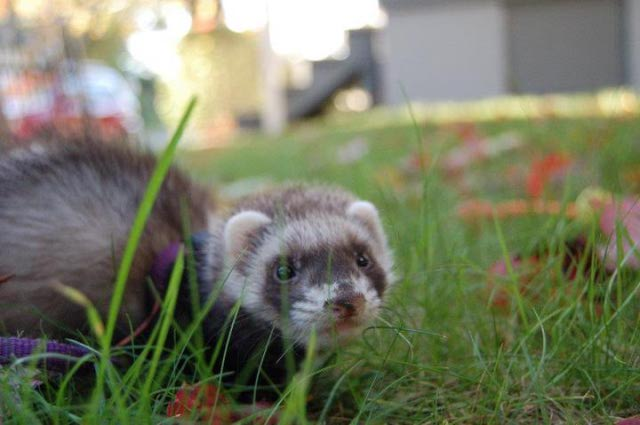 Choosing A Second Ferret.....Vaccine Information
Question
Sirius Black
My lil guy Sirius is one y
Choosing A Second Ferret.....Vaccine Information
Question
Sirius Black
My lil guy Sirius is one y
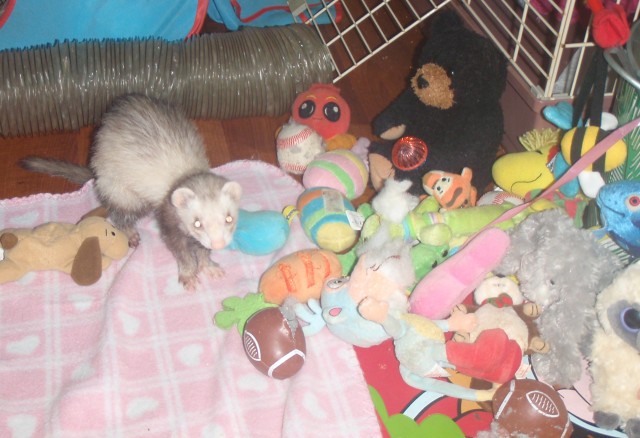 My 7 yr old ferret is obsessively chewing her toys
Question
Cecilia and her babies
Hi,
My ferret Ce
My 7 yr old ferret is obsessively chewing her toys
Question
Cecilia and her babies
Hi,
My ferret Ce
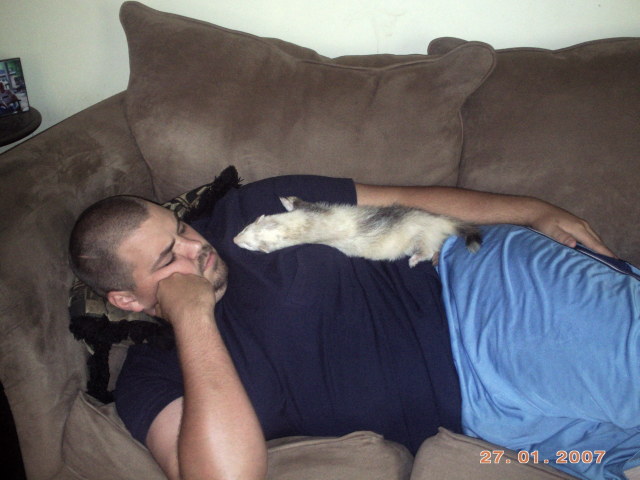 Crazy Ferret
Question
Tweedle and Drew
My son brought home a ferret
Crazy Ferret
Question
Tweedle and Drew
My son brought home a ferret
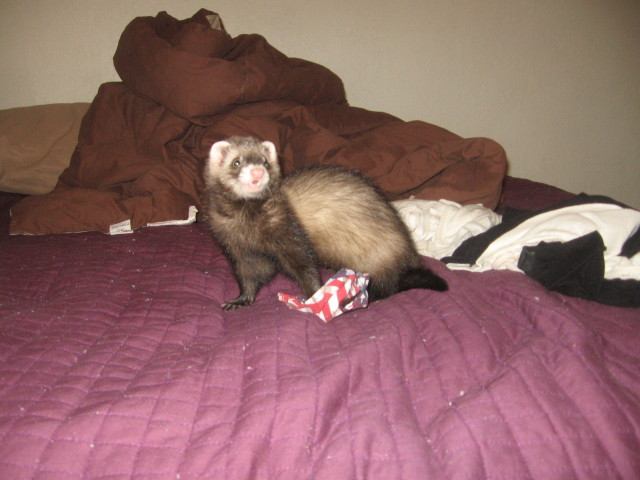 ferret ear problems
Question
I cant wait to get he
Hi Cindy!
I have a ferre
ferret ear problems
Question
I cant wait to get he
Hi Cindy!
I have a ferre
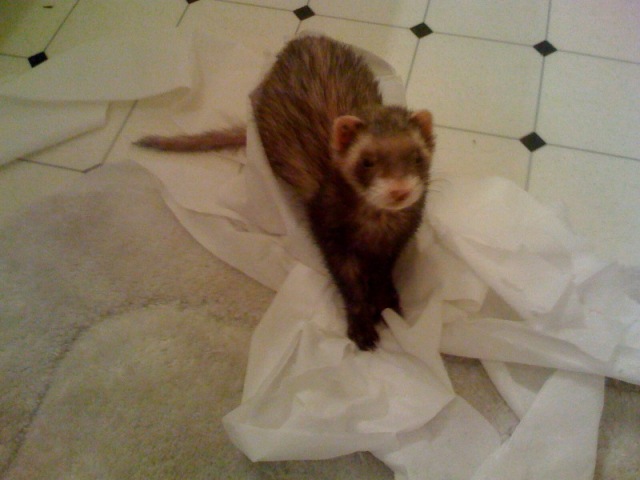 Elderly ferret
Question
Booger
Hi,
I rescued an older ferret named Bo
Elderly ferret
Question
Booger
Hi,
I rescued an older ferret named Bo